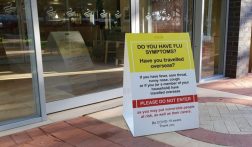The government wants your health records accessible on your phone – and they want it now, writes Chris Baynes.
This week the Minister for Health, Sussan Ley, gave a significant speech at Canberra’s Press Club that has gone largely unreported; but it should have been covered because it had some major news that affects us all.
Among a number of big statements was one concerning the new Turnbull government’s attitude to digital e-health. It likes it and is going to make it happen by opening up all of our health records – without asking us.

Minister Ley announced, “that all-inclusive trials of the Government’s new My Health Record will commence in early 2016 for around 1 million Australians. The e-health trials will be held in Far North Queensland and in the NSW Nepean Blue Mountains region”.
In one statement Minister Ley has moved the nation from the debate about ‘opting in’ to have your personal health information accessible to ‘opting out’, meaning you will have to tell the health authorities you DON’T want your medical records available to all health officials.
This has been a battle ground in recent years as the Labor governments struggled to get agreement on even the ‘opt in’ option.
While no detail was provided by the Minister, it appears the 1 million people in the trial have no choice; they have been ‘opted in’. Medical authorities, it might be said, will generally applaud this move and it is the more popular route internationally.
Digital advantages?
What is digital e-health and why push it? My explanation of e-health is that it captures all your medical information in one place and makes it easily accessible. That is, accessible to you; and in today’s world that means accessible to almost anyone else. This, Minister Ley says, will open up great possibilities for us as consumers.
“The great digital revolution is literally in the palms of consumers. We now live in an age of smartphones, watches and wallets. So why if we, as government, got out of the way and gave consumers full access to their own personalised health data and full control over how to use it?
“What if you, as a consumer, were able to take your personal Medicare and Pharmaceutical Benefit Scheme data to a health care service; to an app developer; to a dietician; to a retailer and say how can you deliver the best health services for my individual needs?
“Why can’t we allow people to create a health portfolio of products and services customised to their own needs simply by providing their data?
“Why can’t we allow someone’s doctor to use an app developed on the free market to monitor their patient’s blood pressure at home following an operation, or keep a real time count on their insulin levels?
“Why can’t we keep informed of our parent’s health well-being via digital connections so they can remain in their own homes, rather than prematurely entering residential aged care?
“The answer is – we can and allowing consumers open-source access to their health data is the way to do it”.
Some important considerations
The concept of a tailored phone app is fascinating. An example could be a dietitian app. With all your health records on your phone the app could interpret new blood results to reappraise your diet and produce a new diet regime without any visits to a dietitian.
Open access to your records could allow panels of doctors to review your health as an online panel, a dream situation for cancer patients. Consider having four specialists in separate medical fields but located in different countries, gathered to collaboratively assess your diagnosis and next steps. And what if they were from low medical cost countries like Thailand or India or Poland, charging $50 per consultation rather than $500?
And of course the emergency situation after a car crash or a stroke – where your full health records were with you on your phone or accessible in the ‘cloud’. No life threatening errors and no unnecessary tests.
How far away is all this? Just a few years it now appears. Is this a good thing given privacy risks? I would say ‘yes’. Especially if my health is at risk.
What do you think?





